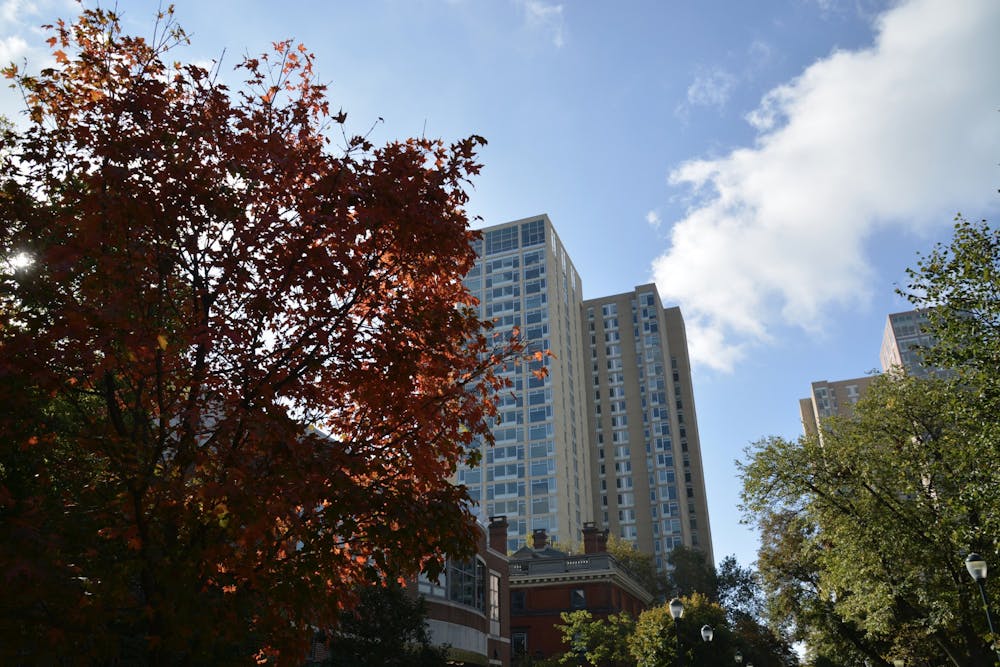
Penn is planning to make the fall semester as equitable as possible by giving priority for on-campus housing to first-generation, low-income students to ensure they have Wi-Fi access and on-campus academic resources.
Credit: Kylie CooperFirst-generation, low-income students expressed concerns about academic equity, housing stability, and health in response to Penn’s decision to open campus for fall 2020.
In a University-wide email sent on Thursday, Penn President Amy Gutmann, Provost Wendell Pritchett, and Executive Vice President Craig Carnaroli announced that fall semester instruction will be offered in a hybrid format through a mix of in-person and online classes.
FGLI students said that while they were relieved to hear they would have housing for the upcoming semester, they are still concerned about balancing responsibilities, prioritizing their health, and accessing academic support.
Rising College sophomore and FGLI Dean Advisory Board member Amy Solano said FGLIDAB sent out a survey on June 25 to FGLI students to gather their concerns about the fall semester and then present them to University administration.
She said FGLI students are concerned about academic equity, since Penn is not planning to give students the option to take their courses pass/fail during the fall semester. In the spring semester, when students were forced to leave campus in mid-March and continue classes remotely, the University allowed students to opt in to pass/fail grading for all of their courses.
College Dean Paul Sniegowski told FGLIDAB that Penn is planning to make the fall semester as equitable as possible, Solano said, by giving priority for on-campus housing to FGLI students to ensure they have access to Wi-Fi and other on-campus academic resources.
Many Penn students believe that online classes create inequities between low-income students and more privileged students, having previously cited disparities in access to quiet workspaces and stable home environments after experiencing the transition to remote learning last semester.
Rising College sophomore Victoria Garcia, who identifies as a FGLI student, said she is concerned about access to on-campus academic resources such as Seven|Eight, which provides space to connect FGLI Asian American and Pacific Islander students, and access to Penn First Plus, which provides FGLI students with academic resources. Garcia said she found out about these centers because she coincidentally met people who worked there, adding that it is not likely that she will meet people perchance who are willing to help her if in-person gatherings are limited in the fall.
According to a Student Campus Compact outlined in the University's June 25 email, students and faculty will be expected to wear facial coverings in public, practice six-feet physical distancing measures in public and in classrooms, and avoid large gatherings of 25 or more people, including in all extracurricular activities.
Rising College sophomore Ryan Afreen and FGLIDAB member said she hopes professors will be more understanding and empathetic with students this semester. She added that many FGLI students are frontline workers who have to balance work, family life, and their personal health on top of academic and extracurricular commitments.
Solano said many FGLI students are also worried about being asked to leave campus again if the number of coronavirus cases starts to rise.
“In the spring, FGLI students didn’t get any housing refunds if they didn’t pay for their housing,” Solano said. “Just because they’re not on campus doesn’t mean they don’t need housing anymore.”
Garcia said she is also concerned about not being provided with housing after classes move online in late November through the start of the spring 2021 semester.
All students will be able to take their courses remotely throughout the semester and in-person operations will end on Nov. 20. Students who applied for on-campus housing will be accommodated with housing either on or off campus, the University's June 25 email read.
“Right now, I’m staying at a friend’s house because my family situation is not healthy,” Garcia said. “Extending winter break without having a good plan for students who need alternative housing during those times is my main concern.”
Afreen said her physical health is her primary concern about the fall semester, as she believes that Penn students might not take the necessary measures to prevent the spread of the coronavirus on campus.
“I can do everything right but I can’t control what other [people] are doing,” she said. “We can set up guidelines and rules, but at the end of the day, we are all busy students and we forget things.”
Afreen said coming back to campus is the best option for many FGLI students who do not have the necessary resources at home, but mentioned concerns about the extra costs students will incur in purchasing such as plane tickets and sanitary equipment. She said that although the costs of hand sanitizer and face masks are not much, they may be heavier burdens for FGLI students whose parents lost their jobs due to the pandemic.
“A lot of people are upset because [Penn’s fall semester announcement] came later than some universities’ and with less details,” Solano said. “People are still left in the dark and there’s not a lot of time to make plans, especially for FGLI students who don’t have the luxury of disposable income to make decisions on the spot.”
The Daily Pennsylvanian is an independent, student-run newspaper. Please consider making a donation to support the coverage that shapes the University. Your generosity ensures a future of strong journalism at Penn.
Donate







